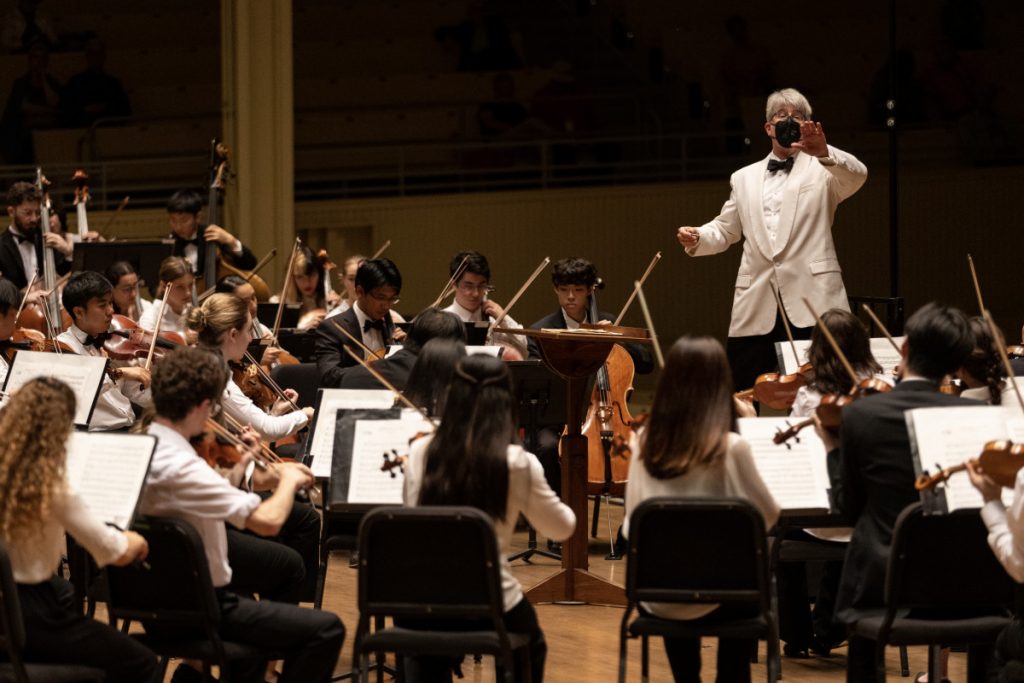
Mariia Novoselia
Staff writer
Three compositions, two conductors, two centuries and 82 music students will make for one impressive concert, as the Music School Festival Orchestra will perform a repertoire varied in style and historical backgrounds at 8:15 p.m. Monday, July 10, 2023, in the Amphitheater.
Timothy Muffitt, conductor and MSFO artistic director, said the orchestra’s 2023 cohort has already come far, considering that they started out just three weeks ago without knowing each other at all. And Ryo Hasegawa, the 2023 David Effron Conducting Fellow, said the performances will only continue to get better.
Akin to the MSFO’s opening concert last week, the repertoire tonight consists of three pieces. Muffitt said his primary objective in choosing pieces for the concert is “creating a great experience for the students.” This, he said, means a high level of involvement from everyone in the orchestra, as well as a broad variety of musical styles.
The orchestra’s evening consists of Shostakovich’s Violin Concerto No. 1; Dvorak’s “Carnival” Overture; and Symphonic Metamorphosis of Themes by Carl Maria von Weber composed by Paul Hindemith. Muffitt said the Hindemith has a peculiar style.
“It’s very German; it’s highly controlled, focused, clear music,” he said. At the same time, the piece contains elements of jazz. Together, these two features provide what Muffitt called “an interesting perspective on our unique American musical style.”
Shostakovich’s Violin Concerto was selected by Julimar Gonzalez, a violinist who, Muffitt said, has been part of the orchestra for years. He said the work presents “a remarkably broad arch” alternating between “a very dark and inward-looking first movement” and “a hair-raisingly exciting finale.”
Muffitt said the audience can expect a wild ride, especially in the hands of Gonzales, winner of last year’s Sigma Alpha Iota competition, carrying with it a $1,000 prize and the chance to select a piece for the MSFO to perform.
Despite being composed within just a few years from each other, Symphonic Metamorphosis and Violin Concerto are drastically different. Both pieces were composed in the 1940s, but under very different circumstances.
Muffitt said Hindemith was free to create in any style of music, whereas Shostakovich, being a Soviet composer, was scrutinized by Josef Stalin and would often “run afoul” of the government. For the fear of “being hauled off to prison,” Muffitt said, his music is “somewhat complicated in terms of … its intent or its inspiration.”
Effron Conducting Fellow Hasegawa chose Dvorak’s “Carnival” Overture, with the MSFO will perform under his baton. The work, he said, is about humanity and does a great job depicting a festival, featuring distinct scenes.
“It’s almost like you’re reading a story or some sort of narrative,” Hasegawa said. Starting with a joyous carnival, where everyone is dancing around and having fun, the music transitions into a traditional Czech song, after which it changes gears and embraces the theme of love.
In March, after a day of hiking in the woods in West Virginia with no cell phone service, Hasegawa got the news about being chosen as this year’s fellow. He began conducting in college and is now pursuing a doctoral degree in orchestral conducting at Peabody Institute of The Johns Hopkins University in Baltimore.
“As conductors, we are totally powerless if we don’t have musicians to make music with,” Hasegawa said. “I think it’s a privilege for me to have these great, wonderful musicians in the orchestra – very talented, very passionate, very kind and fun to work with.”
Violinist Nora Wang said her favorite piece from tonight’s repertoire is Dvorak’s overture. She’s been playing the instrument since she was 4 years old. Sixteen years later, she said, her favorite thing about violin is “bringing your own creativity to the piece.”
While the notes are the same for all musicians, she said, everyone interprets them in their own way.
“It’s really fun to see how different people bring their energies and their own ideas to the same work,” she said.
This summer is Wang’s first season at Chautauqua. She said her schedule has been vigorous, with a lot of opportunities to practice solos, chamber music and orchestral playing. She said she was very grateful for the opportunity to work with the conductors.
“I think it’s really wonderful that everyone can come together and unite under the conductors to create something that’s bigger than themselves,” Wang said.
In his second season with MSFO, Danny Sesi, a 22-year-old double bassist from Ann Arbor, Michigan, has enjoyed being back at to Chautauqua.
“It’s quiet, but it has all the artistic and cultural offerings of a major city during the summer,” Sesi said.
As a conductor, one of Hasegawa’s convictions is that “music should be shared,” and he is excited to do just that with the July 10 performance.




